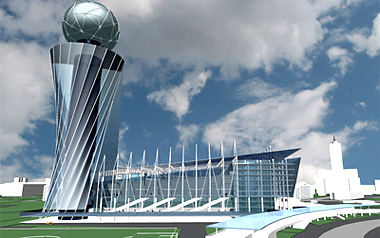By David Gold at the Inside World Football Forum in Moscow
June 24 – The deputy chief executive and international relations director of Russia’s World Cup 2018 Organising Committee believes money will not be an issue for its preparations for the tournament whilst speaking at the Inside World Football Moscow Forum.
Responding to a question from insideworldfootball about leveraging the costs of the World Cup through private investment, Alexander Djordjadze said: “The bulk of financing will be through federal money and thus we do not see a problem with affording the stadiums.
“If the question is how much will finance be an issue, the answer is that it won’t be.”
Djordjadze discussed Russia’s plans to construct a number of modern stadia fit to host the World Cup, and revealed plans to use flexible seating to prevent the potential for so called “white elephant stadia”, where the venues for the World Cup can barely be filled by the local teams occupying them post 2018.
“Stadiums are where the magic happens,” he said, acknowledging the wider infrastructural development that will be required.
“All the stadia need to be done by 2017, so there is not much time.
“If you were summarising the vision of the World Cup in Russia in one word, it would be ‘legacy.’
“Most stadia in Russia do not need 40-50,000 spectators.
“We will use flexible capacity to make these stadiums economically viable.”
Djordjadze spoke during a session looking at how Russia will develop the required stadia to host the 2018 tournament, and he was joined by Diarmuid Crowley, the senior vice-president of IMG, and John Barrow, senior vice-principal of Populous.

They discussed the construction of the new Wembley stadium, which the two companies – along with Wembley Consulting – worked upon.
“We’ve created a flexible stadium for concerts, motor racing and other events,” said Barrow, emphasising the need to ensure that a ground is commercially viable in the long run.
Getting the support of the business community is vital.
“Corporate hospitality was one of the key areas that made [Wembley] possible,” added Crowley, who then also spoke of the many lessons to be learned from the construction of Wembley.”
“When Wembley was opened there were 94,000 mistakes!
“Now it is just 14, but there is a lesson for clubs building stadia for 2018, which is to make sure your partners are making money; there is nothing worse than working with a contractor who is losing money.”
Contact the writer of this story at zib.l1745043429labto1745043429ofdlr1745043429owedi1745043429sni@d1745043429log.d1745043429ivad1745043429

